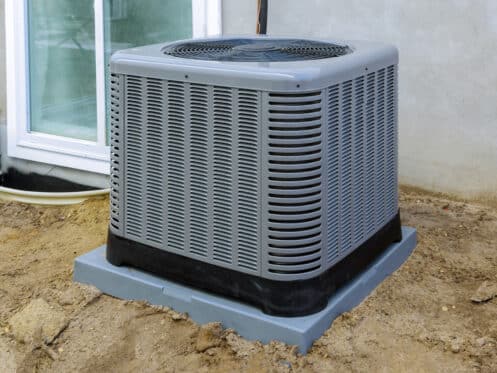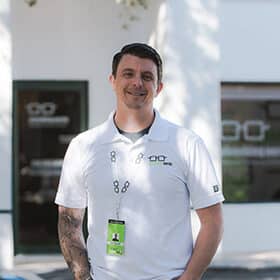Maintaining your air conditioning system is important for preventing issues from arising and ensuring it works effectively whenever you need it to. In Southwest Florida, many homeowners leave their AC switched on throughout the year. The fact that your AC unit will sit idle for much of the winter and only run occasionally can make it more difficult to spot any issues, which could lead to it performing poorly when the hot, humid weather returns. This is why we recommend following these maintenance tips to protect your AC over winter and ensure it can continue cooling effectively.
Clean Around and Inside Outdoor AC Unit
It’s always important to keep the area around your AC unit free of leaves and debris and also trim back any vegetation so that the front and sides of the unit have at least a few feet of clearance. This helps to prevent the sides of the unit from clogging up and also ensures that it always has proper airflow. If air can’t flow through the unit, it won’t be able to effectively release the heat it removed from inside the home.
Insufficient airflow will not only greatly decrease the system’s effectiveness, but also put extra strain on the compressor motor and could lead to it overheating. Overheating can damage the unit’s wiring and electrical components or even cause the compressor motor to burn out, so this is definitely something you want to avoid. The added strain can also lead to the compressor motor drawing more energy and possibly overloading the electrical circuit and causing the breaker to trip.
If you see lots of leaves and other organic debris inside the unit, it’s a good idea to have an AC technician clean everything out. This generally isn’t something you can do yourself, as the only way to access the inside of the unit is to remove the top grate and fan assembly. The reason why keeping the inside of the unit clean is to ensure it works effectively and prevent overheating and other issues. Leaves and organic matter can hold onto lots of moisture, which can lead to the internal components rusting and corroding.
Adjust the Thermostat Settings
One of the great things about living in Southwest Florida is that even our winters are fairly warm. Of course, this also means that AC systems in our area get lots more use throughout the year since there are some winter days when it can get warm enough that you’ll want to have your air conditioning running. This increased workload can result in lots of extra wear and tear on your AC unit and greatly reduce its lifespan, so you should take some steps to make sure your AC isn’t running needlessly.
The easiest way to do this is to just adjust your thermostat setting and turn the temperature up a few degrees so that your air conditioning will only kick on when it’s absolutely necessary. If you normally keep your thermostat set around 70 degrees in the hotter months, turning it up to 75 degrees will help prevent unnecessary wear and tear and also save you money on your electricity bills.
You also need to monitor the weather to ensure you never let your AC run when the outdoor temperature is 60 degrees or cooler. This is important for preventing the AC evaporator coil inside your house from freezing up. If an AC runs when it’s below 60 degrees, the refrigerant can get too cold and lead to the condensation that forms on the coil freezing. This can be a major problem, as it could lead to the compressor motor seizing up and burning out if the system is left to run when it’s frozen.
Installing a smart thermostat is a great way to take the hassle out of programming your AC and also ensure that the system only runs when needed. Most smart thermostats have a “learning” capability that allows them to automatically program the settings themselves based on your behavior patterns and daily routines.
Some more advanced units also have a weather-monitoring feature that enables them to turn the AC on or off and adjust the temperature settings based on current outdoor temperatures and weather forecasts. On particularly hot days, the thermostat will ensure that your AC runs and your home keeps cool. It will also ensure that your air conditioning stays shut off any time it is too cold for the system to work properly so that it doesn’t freeze up.
Check and Replace Your AC Air Filter Regularly
In the hot, humid months when your air conditioning runs a few times an hour day and night, you’re usually best to replace the AC air filter every four to six weeks. Since your AC won’t run all that much in the winter, you probably won’t need to replace the filter more than once or twice. However, we’d still recommend that you set a reminder to check the filter monthly.
Gently wiping away dust and hair off of the face of the filter will help it to work more effectively and can slightly extend its lifespan, but you should always replace the filter when it starts looking dark-colored or black. You can also check the condition of the filter by removing it and holding it up to a light. If you’re unable to easily see the light through the filter, it means it is too dirty and should be replaced.
Use a Dehumidifier to Prevent Humidity Issues
Since the winters in Southwest Florida are still usually moderately humid, there are times when the humidity level inside your home can get too high if your air conditioning isn’t running. High indoor humidity can be a big problem since it can cause condensation to form, potentially leading to microbial growth growth and water damage. If your home often feels overly humid, you may want to consider installing a whole-home dehumidifier.
Although these units are typically meant to work alongside an AC system, you can also run the dehumidifier on its own by changing the fan setting on the thermostat to “On.” This will turn on the blower so that it continually circulates air through your ducts and allows the dehumidifier to constantly draw moisture out of the home. You can also control the dehumidifier with a humidistat so that it only runs when the humidity level rises above a set percentage, which will lessen the energy use of the dehumidifier and blower.
Schedule a Professional AC Maintenance Service
In northern climates, AC systems are typically inspected and serviced just once a year, given their limited usage. However, in Florida, it’s advisable to schedule AC maintenance twice a year – once in early spring and again in the fall. This biannual maintenance routine improves AC performance, extending its lifespan and improving energy efficiency, resulting in lower cooling costs. Regular inspections are a must when addressing any necessary repairs promptly and prevent minor issues from evolving into major problems.
Important Tips for Winter AC Maintenance in Florida
Plumbing & Cooling Nerds is the top choice for AC maintenance in Cape Coral, Bonita Springs, Naples, Fort Myers, and throughout Southwest Florida. Our certified technicians repair and service all AC makes and models, and we can also take care of your HVAC installation and plumbing needs. For more information on the benefits of AC maintenance or to schedule an inspection and tune-up service, give us a call today.

